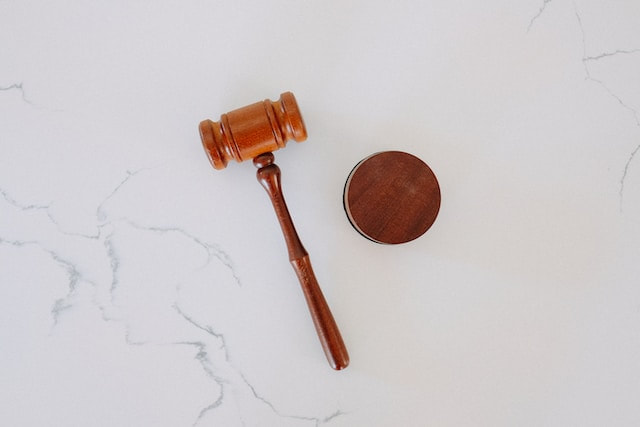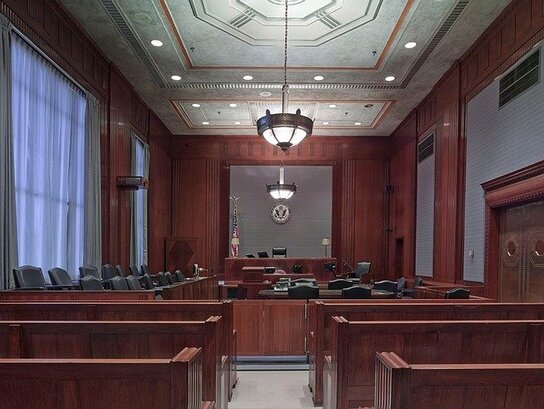|
By Attorney Edward Jesson - Updated 2/29/2024 (Originally Published 3/27/2019)
People and businesses get sued every day, and while no one enjoys being on the receiving end of a lawsuit, there are certain things that should be done to try and make the experience as painless as possible. In North Carolina, a lawsuit is generally started when an individual or a business (also called the “plaintiff”) files a complaint. The clerk of court issues a summons, which must be served on the defendant (the party being sued). This can generally be done by mailing it certified mail, return receipt requested, sending via FedEx or UPS, or having the county sheriff personally deliver a copy of the summons and complaint. Once the summons and complaint have been served, the defendant has 30 days to respond to the complaint in district and superior courts. In small claims court, when a defendant is served (in some instances this can be achieved by the sheriff leaving a copy of the complaint taped to the front door), they will usually receive a notice of hearing along with the complaint. Here is the first point that I would like to make clear: if you are served with a lawsuit, please do not wait until day 29 to contact an attorney. Evaluating your position as a defendant in a lawsuit and preparing the correct response takes time. While you can usually get a 30-day extension of time to respond, doing so at the last minute is not always possible, and the extension likely won’t be granted if it is after day 30. If you fail to respond to the complaint in time, the plaintiff may be entitled to a default judgment. It is exactly what it sounds like— they will automatically win “by default”! A default judgment can be hard to overcome once it is entered, and the excuse that you simply “forgot” to respond is usually not enough. Point number two: Do not answer the complaint without first consulting with an attorney. In an answer, you will generally just admit or deny the allegations to the complaint, but that is not the only response that is available. There are several ways that you may be able to get the lawsuit dismissed (meaning the case is thrown out), but that option is not available if you admit or deny allegations in the answer first. By doing that yourself, you may be preventing an attorney from later dismissing the lawsuit. For most people who are sued, it is for the first time in their lives (and hopefully the only time). Once the shock, confusion, and anger has worn off, it is important not to bury your head in the sand. Contact a litigation attorney who can help you navigate through the civil system and, hopefully, get your case resolved in the most efficient way possible. If done correctly, you may save a lot of money; however, trying to handle it yourself oftentimes results in the expenditure of more money. If you or anyone you know has been sued, please give the attorneys at Jesson & Rains a call.
0 Comments
By Attorney Edward Jesson
One of the questions we frequently get asked when we are advising clients about their options when contemplating entering into a lawsuit is: Can I make the other side pay for my attorney’s fee? The answer to this question is very fact dependent, but the general answer is “no”. It is a common misconception that you are able to claim the money you pay your attorney to pursue a case in court as damages on top of the damages that you have actually suffered. While in many other countries it is commonplace to have a “loser pays” system, wherein the loser of the lawsuit is responsible for paying the other side’s legal fees, that is not the case in the United States. In fact, the general principal that each opposing party must pay their own legal fees regardless of who wins the lawsuit is known as the “American Rule.” For example, if you sue someone for $100,000.00 it costs you $20,000.00 in legal fees to win that lawsuit—at the end of the day under the American Rule, you are only entitled to $100,000.00, not $120,000.00. So in reality, after paying your attorney that $20,000.00, you are only netting $80,000.00. However, the American Rule is just a general rule and, under North Carolina law, there are certainly exceptions to that rule. Generally speaking, in order for there to be an exception to the American Rule in North Carolina, there has to be a statute authorizing the award of attorney’s fees to the winning party in the lawsuit (usually referred to as the prevailing party in North Carolina’s General Statutes). For example, the winning party in a lawsuit brought under North Carolina’s Unfair and Deceptive Trade Practices Act, or North Carolina’s Wage and Hour Act, will generally be entitled to an award of reasonable attorney’s fees. Another instance where questions regarding an award of attorney’s fees frequently arises is when there is a contractual provision stating that one party or the other is entitled to attorney’s fees should a lawsuit be brought based on a breach of the contract. In order for an attorney’s fee provision in a contract to be enforceable: (1) the contract must be a “business contract”, i.e. a contract entered into primary for business or commercial purposes and not a consumer nor employment contract; and, (2) the attorney’s fee provision must be reciprocal, meaning no matter who loses, the loser pays. There are many other statutes in North Carolina that allow for the award of attorney’s fees. If you are considering litigation, the potential for an award (or lack thereof) of attorney’s fees can often be an important consideration. The attorneys at Jesson & Rains can help you evaluate your options in order to make the most informed decision possible. By Attorney Edward Jesson
To the chagrin of many North Carolinians who believe they have been wronged, with very few exceptions, you need to have been actually “damaged” successfully bring a lawsuit against another party. While there are several types of damages available to litigants in North Carolina, in most cases, a plaintiff in a lawsuit will be seeking monetary damages. Monetary damages are, for the most part, meant to be compensatory in nature. The money damages that you may eventually be awarded are meant to compensate you, or “make you whole,” for the loss you have suffered. For example, what if you find a dead mouse in your McDonald’s sandwich? While shocking, unless you ate it and suffered illness or medical expenses, you would not be awarded much in court other than the cost of the sandwich – and who wants to pay a lawyer for that? Take an example where you believe that someone has made a slanderous or defamatory statement against you. Even if you could prove that the person made the statement and that it was false, that might not be enough to win your lawsuit. You would then need to prove that because of the defendant making that defamatory statement you were in some way monetarily damaged. It is very difficult to get non-economic damages, like emotional distress, in North Carolina. A plaintiff can be awarded what are known as nominal damages in North Carolina. These are damages that acknowledge that a defendant violated the law (for example, making a defamatory statement) but also acknowledge that no actual loss was suffered by the plaintiff in that situation. An example of nominal damages could be awarding a plaintiff $1.00 when the defendant made a defamatory statement. Yes, a defamatory statement was made, but the plaintiff did not suffer any real harm from that statement being made. And again, who wants to pay a lawyer for that? There are many other categories of damages that can be claimed in North Carolina, which are very dependent on the specific circumstances of the case. It is important, when discussing a lawsuit with an attorney, to discuss the damages portion up front to ensure that you have a reasonable expectation of what you may stand to gain (or lose) if the lawsuit does end up in front of a jury. It is not always enough that the potential defendant has violated the law if you cannot prove damages. The attorneys at Jesson & Rains can help guide you through what your options are if you feel that you may have a claim against another in a lawsuit. By Attorney Edward Jesson
A Sheriff’s deputy has just showed up at your door and handed you a summons. Or you received a summons via FedEx or Certified Mail. Do you need to hire a lawyer to move forward with things? This is highly dependent on a lot of things, but often most importantly, whether the Defendant that has been sued is an individual or a business entity. In North Carolina, an individual has the right to represent his or herself. So, if you have been sued in your individual capacity you have the right to represent yourself in court. This is known as proceeding pro se. Sometimes we even recommend our clients proceed pro se. For example, if an individual has been sued in small claims court for a small amount of money, often times the legal fees that might be incurred in defending that small claims action would exceed the damages that were being claimed. Moreover, small claims court is fairly well designed for those who wish to proceed pro se with a lot of the formalities that are present in District and Superior Court being relaxed. However, if the summons is for District or Superior Court, while an individual is still permitted to represent themselves in those proceedings, generally we would advise against that. In District and Superior Court the North Carolina Rules of Civil Procedure, the North Carolina Rules of Evidence, and applicable Local Rules, and various other rules and regulations apply. The majority of the time we find that individuals proceeding pro se end up getting tripped up by these rules—often with serious long lasting financial consequences. However, things are much different if the Defendant being sued is a business entity such as a corporation or a limited liability company. In North Carolina a business entity cannot represent itself nor can a member or owner of the business represent the business in court unless that individual is an attorney licensed to practice law in North Carolina (or has been admitted to practice in North Carolina on another basis). If a business owner (that is not permitted to practice law in North Carolina) files a response on behalf of the business that they own, they are engaging in the unlicensed practice of law which is a Class 1 Misdemeanor in North Carolina. Any documents filed by an unlicensed attorney could be stricken by the Court which could result in a judgment being entered against the Defendant, even though the Defendant may have thought that they properly responded. Repeated violations of the law could result in financial sanctions being awarded by the Court or injunctions being sought by the local district attorney. Generally speaking, if you receive a summons, regardless of what it is, it is in your best interest to at least consult with an attorney to see what your options are. Depending on the situation, it may be advisable to move forward and represent yourself. However, in a lot of circumstances the litigation can be a mine field for those who are not used to appearing in court on a regular basis. If you receive a summons, or have any other questions about the litigation process, the attorneys at Jesson & Rains are ready to help. By Attorney Edward Jesson
Last December, Congress passed the Copyright Alternative in Small-Claims Enforcement Act of 2020—better referred to as the CASE Act. The CASE Act instructed the U.S. Copyright Office to create the Copyright Claims Board (“CCB”) as an efficient and user-friendly option to resolve copyright disputes where the amount disputed is less than $30,000.00. Generally speaking, before the CASE Act, a copyright holder would have had to file a lawsuit in federal district court in order to enforce his or her copyright. The problem with this is that federal litigation is both expensive and time consuming. Many professional content creators and small businesses simply could not afford to enforce their rights under copyright law. Moreover, the people who were infringing on those rights knew that in all likelihood nothing would be done as a result of their copyright infringement. The CCB will be permitted to hear three different types of claims: (1) Creators bringing infringement claims against people infringing on their copyrights; (2) Users can request that the CCB issue a statement ruling that their use of something does not infringe on the copyright owner’s rights; and (3) Users who receive a Digital Millennium Copyright Act (“DCMA”) takedown notice (similar to a cease and desist) are able to challenge that notice if they feel it is inaccurate. It is important to note that, if the copyright holder prefers, they can still bring the claim in federal district court (assuming all other jurisdictional factors are satisfied) or move forwards with mediation and arbitration. Also, the Respondent can “opt-out” of the CCB proceeding, requiring the copyright holder to move forward with a federal lawsuit. However, there are several incentives for those named as respondents in CCB proceedings to opt-in to the proceeding. For example, on top of the cost of litigation in federal court, a successful plaintiff in a federal proceeding can be awarded up to $150,000.00 per work infringed whereas, in the CCB setting, that amount is limited to $15,000.00 per work infringed. The CASE Act also caps the damages that can be awarded by the CCB at $30,000.00 whereas, in federal court, those damages are unlimited. Once the CCB is fully established (as of writing, it is currently still in the rule making stage), it will provide small businesses and individual creators a cost and time effective way of enforcing their copyrights under federal law. If you believe that your copyright has been infringed or that you have been wrongly accused of infringing on a copyright, please call the attorneys at Jesson & Rains for a consultation on the matter today. In North Carolina, a Plaintiff (the party filing a lawsuit) can seek an “Order of Attachment” in certain circumstances. Generally, this means that any property in North Carolina that the Defendant owns, including bank accounts, can be seized by the County Sheriff to satisfy any eventual judgment pending the outcome of the lawsuit. This can be problematic for several reasons: first of all, the Plaintiff may lose the case and not be awarded any damages and the property was seized unnecessarily! Also, at the beginning of a lawsuit, the number that a Plaintiff claims he or she has been damaged may not be a realistic number and is based purely on their opinion of the case. Having large sums of money seized during the pendency of a case (which could take years to settle) could cause a business to go bankrupt.
Thankfully, an attachment order will only be issued in a few circumstances. The Defendant must be:
The Plaintiff must pay a bond to the Court which must be high enough to compensate the Defendant if the Defendant prevails in the lawsuit or is damaged by an improper attachment. Obviously that bond will greatly vary and is somewhat up to the discretion of the judge who is hearing the attachment order. Fortunately, if you have received an attachment order, you do have options to dissolve or modify the order. To dissolve the order, you must show that something was done improperly in obtaining the order (for example, that you do not fall into one of the categories of people who can have their property attached). If you are unable to make that showing, you can try to have the attachment order modified—either the amount of the attachment, the bond, the terms, or both. Attachment orders are just one more way that lawsuits can cause problems to the people involved. If you, or someone you know, receives a summons, attachment order, or notice of garnishment, the attorneys at Jesson & Rains, PLLC are ready to assist. |
Subscribe to our newsletter.AuthorKelly Rains Jesson Categories
All
Archives
July 2024
|
|
SERVICES |
SUPPORT |
©Jesson & Rains, PLLC ALL RIGHTS RESERVED.







 RSS Feed
RSS Feed

